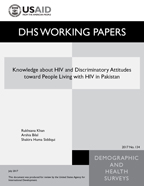- PUBLICATIONS
- JOURNAL ARTICLES
- ACCESS PUBLICATIONS
Publications Summary
Knowledge about HIV and Discriminatory Attitudes toward People Living with HIV in Pakistan (English)
- Document Type
- Working Papers
- Publication Topic(s)
- HIV/AIDS
- Country(s)
- Pakistan
- Language
- English
- Recommended Citation
- Rukhsana Khan, Arshia Bilal, and, Shakira Huma Siddiqui. 2017. Knowledge about HIV and Discriminatory Attitudes toward People Living with HIV in Pakistan. DHS Working Paper No. 134. Rockville, Maryland, USA: ICF.
- Download Citation
- RIS format / Text format / Endnote format
- Publication Date
- July 2017
- Publication ID
- WP134
Download
 Knowledge about HIV and Discriminatory Attitudes toward People Living with HIV in Pakistan (PDF, 439K)
Knowledge about HIV and Discriminatory Attitudes toward People Living with HIV in Pakistan (PDF, 439K)
